In recent weeks, I’ve attended two events, SEE 6, hosted by the RIPE NCC in Budva, Montenegro, and the 10th European Dialogue on Internet Governance (EuroDIG) in Tallinn, Estonia. At both events, I had the opportunity to speak about the issue of sustainable access to the Internet.
At EuroDIG, this took the form of a roundtable workshop focused on certain aspects of sustainability that usually lie outside the realm of discussion within the Internet community in general, and are almost completely absent from the Internet governance agenda in particular (special thanks to Chris Buckridge for all his support and encouragement, and also for addressing the issue on CircleID). With that experience fresh in mind, I submitted a last-minute lightning talk to the SEE 6 Programme Committee exploring how the technical community is crucial to enabling sustainable access, but more importantly, how sustainability is good for business (my audience mainly included operators and members of the peering community, after all).
When I say sustainable access, I am defining it as the ability for any user to connect to the Internet and then stay connected over time. Of course, this touches on many aspects of the relationship between technology, society, and the environment, including:
- The need for robust and reliable infrastructure, such as fiber optics and Internet exchange points (IXPs), and the kind of energy supplying critical Internet infrastructure or cooling servers;
- How much power information and communications technologies (ICTs) are consuming, how such power is being generated, and the energy costs of data generation, storage, and transit;
- The sourcing, manufacturing, and recyclability of Internet-connected devices/ICTs;
- Human-centric needs and skills, such as digital literacy skills, affordable services, local, relevant content, and community-led networking (community networks);
- Digital pollution, the availability of resources such as radio spectrum, Internet Protocol (IP) addresses, and Autonomous System (AS) numbers, and the implementation of IP version 6 (IPv6);
- And lastly, the ecological impact the digital world is having, such as the impact of electronic waste (e-waste) on both the environment and communities.
Although I have addressed some of these aspects in the past, sustainability – environmental sustainability as it relates to the Internet and ICTs in particular – is increasingly becoming an area on which I’m focusing. Whether it’s exploring the relationship between climate change and the Internet, or discerning how much energy the Internet and ICTs consume, making this a topic of discussion is critical for a number of reasons. As we race to connect the next billion people (and the billions after that), we cannot legitimately discuss Internet access without addressing sustainability.
Why sustainability is important
Aside from connecting more people over time, current estimates place the growth of the Internet of things (IoT) at a staggering 20.4 billion devices by 2020 – and that’s the conservative figure. Where are those devices going to come from? How are they going to be manufactured and eventually recycled (or simply discarded)? What kind of energy is going to power the data centers feeding our increasingly data-hungry habits? How do we mitigate machine-to-machine (M2M), ICT, and data transit energy consumption, which is rising as well? What will we do with all the fiber that was laid when it needs to be replaced? And what about other aspects of technology, such as whether or not the minerals in those devices are mined from conflict zones, only to be shipped back one day to be dumped in a slum?
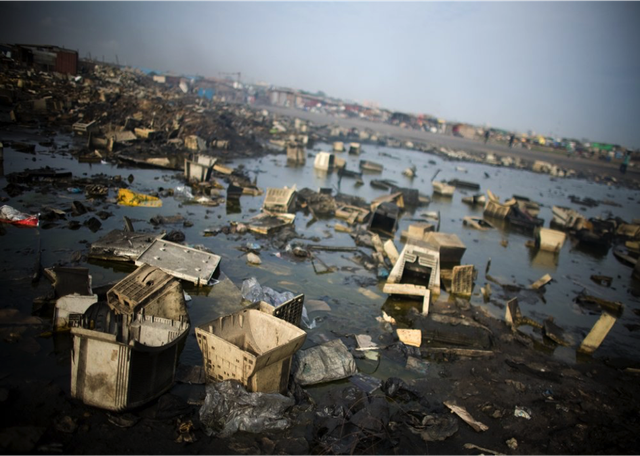
Figure 1: An unidentified e-waste dump
These are but a few of the myriad questions that are going unanswered. The fact is we are reaching a point in our civilizational arc where we can no longer ignore that digital technology has a significant ecological footprint. This might seem self-evident to those within the European community, but I prefer to let the data do the talking:
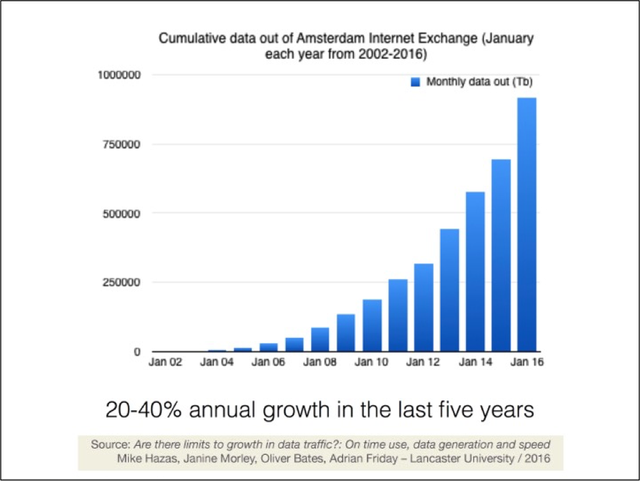
Other than representing some good news for AMS-IX, the graph above represents a growing trend throughout the Internet ecosystem: more data production, consumption, and storage. In case the connection to the topic at hand isn’t sufficiently self-explanatory, perhaps this one will do:
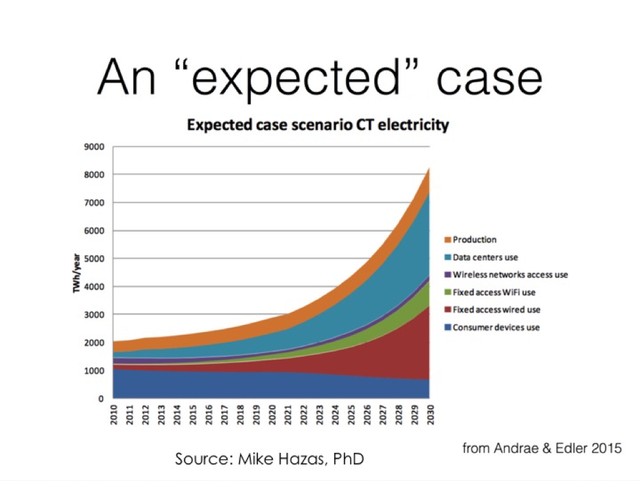
Simply put, the writing’s on the wall: with more data comes more energy consumption and a greater impact on the environment.
Fortunately, there’s a catch, and this time, it’s a good one: as I mentioned, sustainability is good for business!
The experience of ARMIX, an IXP in Armenia
If anyone reading this is an IXP operator, you’ll know how much the energy costs contribute to your monthly bills. This was a growing concern for ARMIX, an Internet exchange based in Yerevan, Armenia, and I decided to write about their experience after meeting Vahan Hovsepyan, the director of the ARMIX Foundation at ICANN 58. Around three years ago, ARMIX reached out to the Internet Society (ISOC) seeking ways to help them integrate renewable energy into their operations, promote green energy solutions, and reduce their electricity costs and consumption. ISOC eventually donated 18 solar panels that produce more than 4 kilowatts of power to help them with one of their points of presence (PoPs).
As a result, their electricity costs have dropped by more than 30 percent, and they are now much less reliant on non-renewable energy sources. The panels have been so helpful, they are now looking for ways to expand the use of solar to their other two PoPs. Moreover, they want to set a good example of technology companies that help to change their physical environment, and are also encouraging other operators within the Commonwealth of Independent States (CIS) region to integrate renewable energy sources.
ARMIX’s success is also an example of the success that can come from the combination of enabling government policy-making, effective public-private partnerships, and sustainable planning, since the government began incentivizing solar and a local solar solution provider assisted them. It is also a good example to other operators looking to cut their own costs. Perhaps other local or country-specific initiatives could help bring solar, wind, or other renewable solutions to your operations, whether it’s via a government mechanism or by collaborating with local solar providers in the private sector.
Regardless of whether someone has a technical background (or doesn’t), operates an IXP, or is simply invested in the Internet ecosystem, there is so much more we can do to help people get online and ultimately stay online. The Internet is an inherently collaborative project, and the more we work together, the better it will get. I see the technical community’s role in ensuring that the next 5, 10, 20 years of Internet development continues to be more innovative, enriching, and life changing – but also, perhaps a bit greener.

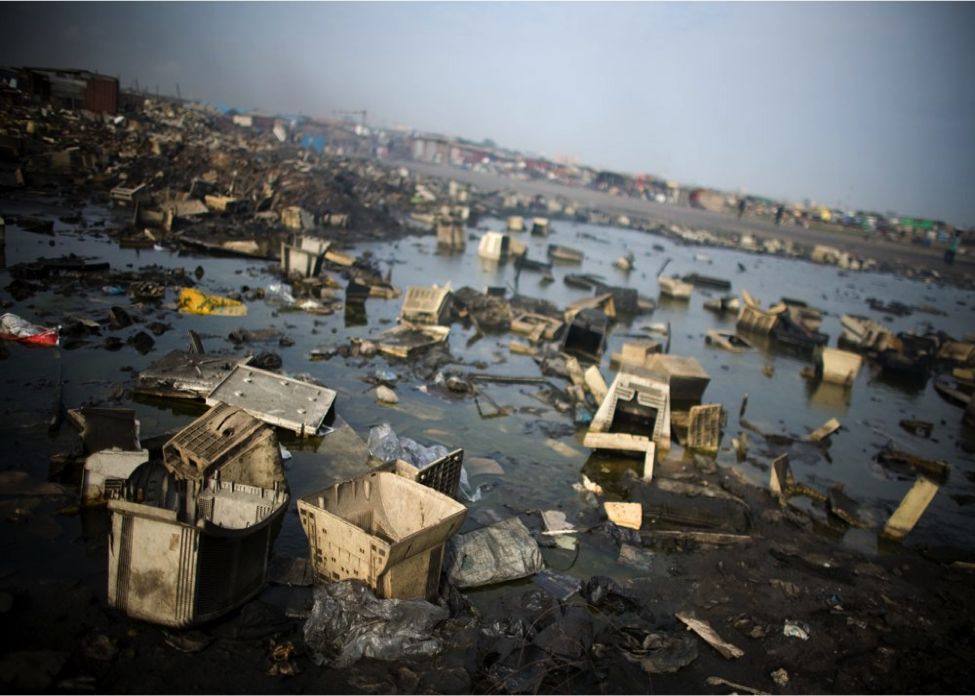

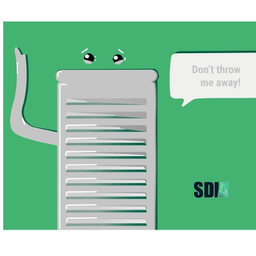
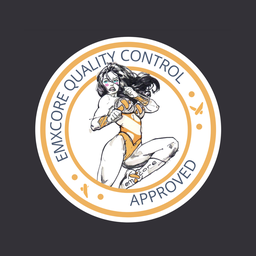
Comments 4
The comments section is closed for articles published more than a year ago. If you'd like to inform us of any issues, please contact us.
mike •
While the AMS-IX graph is impressive, AMS-IX power usage has not increased in line with traffic growth. In fact, I'd guess their power bill has been more or less flat over the past 15 years. Moore's Law ensures that data traffic does not result in a linear growth of energy usage, nor does processing power grow in the same way - the average smartphone is about as powerful as a Cray 2 supercomputer of the mid-1980s which consumed around 200kW. A smartphone uses around 200mW for the same processing power, a million times more efficient. Its also unclear why the second graph only has exponential growth starting around now, when the Internet has been growing exponentially over the past 20+ years. The claim in the paper from which this graph is taken that by 2030, 51% of global electricity consumption will be for communications technology - higher than for all industrial energy usage today - is not credible. However, it is true that energy efficiency and greater use of renewables is important to all of us, and the ARMIX example is good to see, thank you for sharing that.
Michael Oghia •
Hi Mike, thank you for your comment (and please accept my apologies for the late response, I'm currently traveling). Also, many thanks for your kind words and support. It's my pleasure to share it! About AMS-IX, I hear your points. Whether or not their power usage has increased or not, though, is uncertain (I'll ask Bastiaan if he has any publically available data). Also, I addressed ICT power usage in a different article (referenced in the text). It's really uncertain how much energy use ICTs are taking globally. Regarding the second graph, while the Internet has been expanding significantly, the exponential nature of the graph is reflecting trends such as the proliferation of IoT, more global users, more intense use by individuals, and a host of other phenomena. The Internet grew to 3.5 billion users between the early 1990s and the mid 2010s. By 2020, another billion is meant to be online. This is a huge shift in growth patterns. So, when you say the paper's claim is not credible, there is no evidence as to why. Can you elaborate?
mike •
On AMS-IX's power consumption - Netherlands energy prices have fallen by around 2% per annum in the period 2000 to 2015 (from around EUR 58/MWh to EUR 44/MWh in the period - source https://www.cbs.nl/-/media/_pdf/2016/45/national%20energy%20outlook%202016_summary.pdf ). At the same time AMS-IX traffic has increased 20-40% per annum. Given AMS-IX no doubt continues to spend most of its money on equipment and staff and not power, it is clear there is no linear relationship (and possibly no relationship at all) between Internet traffic (and usage) and power usage. As for overall electricity demand growth, the US EIA forecasts an increase in global electricity demand of 43% from 2012 to 2030. (Source: https://www.eia.gov/outlooks/ieo/pdf/0484(2016).pdf - figure 5-1). In 270 pages, this report does not mention once the energy demand of datacentres, information or communications technology on increasing electricity consumption. Surely if communications technology was going to comprise 51% of global electricity demand by 2030, as claimed in the paper linked from the second graph above, they would have at least mentioned this?
Michael Oghia •
Hi again Mike, thanks for this. 1. The point of AMS-IX isn't merely about cost, but about consumption period. Based on the information provided, even if they aren't spending more on energy, that doesn't mean more energy is being consumed. Also, let's say they only used solar, this would largely be irrelevant. It's also about being aware of the footprint we are leaving behind. It also might be distributed elsewhere along the infrastructure chain. 2. Indeed, it is strange that this report doesn't mention anything about it, but perhaps it was purposely left out of its scope. Alternatively, there could be a gulf between sustainable ICT researchers and the authors of this report. Also, I think the 51% mention is meant to be an upper-estimate of what it could be.